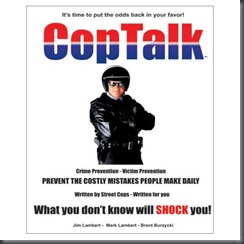San Jose Mercury News
BURLINGAME, Calif. — On most days, you can find Chris Zwingle in his commercial pilot’s uniform behind the controls of a 767 jetliner. But at least once a month, he puts on a different set of blues — those of a police officer — and hits the streets on patrol. Call it extreme volunteering.
The Burlingame resident is among the thousands of reserve police officers in California, many of whom have the same training as full-time cops but work as unpaid volunteers.
Their reasons for doing it vary. Some are retired cops who aren’t ready to give up the job, others are trying to start a career and some just think it’s fun.
The reserve officer program, however, is a bit of a dinosaur on the Peninsula. As state requirements for reserve officers have become more strict in the past 25 years, reserve officer programs have shrunk. Spending reductions have also meant fewer officers to help train the reserve corps.
But as city governments try to avoid cutting public safety spending in order to balance the budget, there is no better time to resuscitate the reserves, police officials said. That will require effort and more funding.
For the love of it
Imagine a photo of two shady-looking guys standing in a dark alley. You can’t see their faces. The writing above the scene says "You wouldn’t go in there for a million bucks. A cop does it for a lot less. A reserve does it for free
This image, which is from a classic California Reserve Peace Officers Association poster, raises the obvious question: Why sign up for a dangerous job and not at least get paid?
Reasons vary but typically fall into one of three categories: community service, love of the job and trying to get hired. During a recent reserve officer meeting at the San Bruno police station, which like nearly every police agency in San Mateo County employs these volunteers, the reserves talked about why they do it.
"Some people hunt, some people work out," said Roger Elu, who spends his days as the chief engineer at AT&T Park. "We put on a uniform and ride around helping the regular officers."
Helping other officers can often mean "gopher work," said Burt Donlin, who has been a reserve since the 1980s. Reserves pick up prisoners, transport evidence or work security at public events. They might also take on the most heroic duty of all: writing reports.
But some reserves end up working a beat, and that can get physical, said Bill Miller, a contractor who has logged at least 5,200 volunteer hours with San Bruno.
"Sometimes it’s a rush," he added.
There is also a long tradition of officers coming on as reserves in order to eventually get a full-time job. San Bruno and Millbrae Police Chief Neil Telford got his start that way, but so have scores of other cops who work in the county.
"It’s a good way for them to see if they like you and the way you work," said Michael Arguel, who has finished the police academy but has yet to find a full-time job as an officer.
Training and lots of it
The people who work as reserves can’t just come off the street, throw on a uniform and go on patrol. The training required by the California Commission on Peace Officer Standards & Training, the enforcer of state police regulations, is the same for regular officers and reserves who work on the street alone.
These people are called Level I reserves, and they have gone through the full police academy, psychological and physical testing, as well as a field training program with the department where they work. There are also Level II and III reserves, but they have less training and fewer police powers.
For a reserve to go through a full-time police academy, such as the South Bay Regional Public Safety Training Consortium, it takes a five-month commitment that costs about $4,000. Would-be reserves can also get their training on nights and weekends, said Michelle Schneider, who runs the police academy at College of San Mateo. Part-time training costs about half as much as the academy but takes twice as long.
In either case, a reserve who is carrying a gun, rides alone in a squad car and makes arrests has done at least 800 hours of state-mandated training. and they have paid for it themselves.
"You’re asking someone who has got a child, wife and a day job to put their life on hold for six months," said South San Francisco Police Reserve Capt. Mike Short. "They can’t do that."
The way of the dinosaur
Those training requirements are what pushed the Peninsula reserve programs toward extinction, police officials said.
Before 1979, there were no statewide education rules for reserves. But starting that year, the Legislature mandated they have 200 hours of training, said Ronald Wood, a state police accreditation official.
A lot of reserves who were working at the time were given a pass, because of the worry that the requirement would destroy small, rural departments that rely on them, Wood said. But the flow of contractors, store clerks or school teachers willing to sign on as weekend warriors and do months of expensive training slowed to a dribble.
Despite thinning the ranks, those interviewed for this story support the training requirements.
"When you give someone the power of life and death, you certainly want them to be trained," said Bill Curley, a retired San Mateo officer who works at the College of San Mateo police academy.
As the decades have passed, these unpaid police have dwindled in number on the Peninsula.
Redwood City police are down to about eight from 15 two decades ago, and San Mateo, which had 12 in the 1980s, now has about four. Other cities reported a similar reduction, but some agencies have maintained robust programs.
The Sheriff’s Office has held steady in its numbers, and it has about 21 reserve deputies at present. Just to the south in Santa Clara County, San Jose’s program has stayed strong at nearly 145 reserves. That department has 1,350 paid officers.
There are also police departments on the Peninsula that just don’t rely much on reserves.
Despite being the biggest police department in San Mateo County with roughly 109 paid officers, Daly City has only one reserve, said Sgt. David Mackriss.
He said paid officers there have in the past resisted the idea. They were concerned that a reserve, despite their training, could be a liability in dangerous situations. Daly City cops also get overtime or have side jobs working security at events and worried reserves could cut into that.
"Officers are wary when it comes to change," Mackriss said.
The future
Many police officials agreed that the reserves could be a big help as cities struggle to balance their budgets. But some also said there are limitations to what role a reserve can play.
Curley said reserves will never replace full-time officers but can be a highly useful resource to thinned-out police departments.
However, it costs money to recruit, train and keep reserves happy, he added. For departments that are already doing more with less, this requires some passion for having reserves.
"If you don’t have somebody who is really dedicated, it’s just not going to work," he said.
Reserve program coordinators from San Mateo, Redwood City and other police departments said they are stepping up efforts to recruit, and it is a good time to be looking for people. There are plenty of applicants, and few cities on the Peninsula are hiring full-time officers. And interest in police work, which carries steady pay, benefits and a pension, goes up when the economy goes down.
"The economy is helping our reserve program. Two years ago, we weren’t seeing as many applicants," said Redwood City police Sgt. Ashley Osborne. She said as long as other departments aren’t hiring, reserve officers will be looking to volunteer in order to keep their state certification active.
But any blessing brought by the economic recession could be a mixed one.
"They are going to come and stay a short time," said Osborne. "The economy will turn (up), and we’ll lose them."
Copyright 2010 San Jose Mercury News








